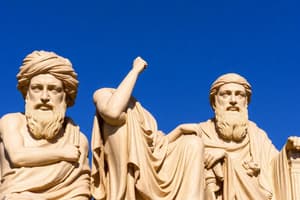Podcast
Questions and Answers
What was a primary focus of Presocratic philosophy?
What was a primary focus of Presocratic philosophy?
- Political governance
- Ethics and morality
- Nature and cosmology (correct)
- Religious doctrines
Which philosopher is known for the theory of Forms and the allegory of the cave?
Which philosopher is known for the theory of Forms and the allegory of the cave?
- Aristotle
- Plato (correct)
- Heraclitus
- Socrates
What does Stoicism identify as the highest good?
What does Stoicism identify as the highest good?
- Virtue (correct)
- Pleasure in life
- Knowledge and reason
- Wealth and power
Which category of philosophy studies knowledge and belief?
Which category of philosophy studies knowledge and belief?
What is a significant influence of Greek philosophy on contemporary thought?
What is a significant influence of Greek philosophy on contemporary thought?
Flashcards are hidden until you start studying
Study Notes
Overview of Greek Philosophy
- Emerged in Ancient Greece around the 6th century BCE.
- Marked a shift from mythological explanations of the world to rational thought and inquiry.
Key Periods
-
Presocratic Philosophy (6th - 5th century BCE)
- Focused on nature, cosmology, and the origins of the universe.
- Key figures:
- Thales: Water as the fundamental substance.
- Heraclitus: Change as central to the universe ("you cannot step into the same river twice").
- Pythagoras: Mathematics as a principle of order.
-
Classical Philosophy (5th - 4th century BCE)
- Development of ethical and political thought.
- Key figures:
- Socrates: Emphasis on ethics, the Socratic method (dialogue as a means to knowledge).
- Plato: Theory of Forms, idealism, and the allegory of the cave.
- Aristotle: Empirical observation, categorization of knowledge, virtue ethics.
-
Hellenistic Philosophy (4th - 1st century BCE)
- Focus on individual ethics and how to achieve happiness.
- Key schools:
- Stoicism: Virtue as the highest good, acceptance of fate.
- Epicureanism: Pursuit of pleasure and avoidance of pain.
- Skepticism: Questioning the possibility of certain knowledge.
Major Themes
- Metaphysics: Nature of reality, existence, and the universe.
- Epistemology: Study of knowledge and belief; how we know what we know.
- Ethics: Exploration of moral values and principles.
- Political Philosophy: Concepts of justice, governance, and the role of individuals in society.
Influence
- Laid groundwork for Western philosophy.
- Impacted various fields: science, politics, ethics, religion.
- Philosophy remains a cornerstone of contemporary thought and discourse.
Notable Contributions
- Development of logical reasoning and dialectical methods.
- Introduction of systematic inquiry into moral and ethical issues.
- Establishment of schools of thought that influenced later philosophical traditions, including Roman and Renaissance philosophy.
Overview of Greek Philosophy
- Originated in Ancient Greece around the 6th century BCE, transitioning from mythological to rational explanations of the world.
Key Periods
-
Presocratic Philosophy (6th - 5th century BCE)
- Concentrated on natural phenomena, cosmology, and the universe's origins.
- Thales proposed that water is the fundamental essence of all matter.
- Heraclitus emphasized change, stating "you cannot step into the same river twice."
- Pythagoras viewed mathematics as a foundational principle providing order to the universe.
-
Classical Philosophy (5th - 4th century BCE)
- Gained importance in ethical and political thought.
- Socrates pioneered ethical inquiry and the Socratic method, a dialectical approach to gain knowledge.
- Plato introduced the Theory of Forms, highlighting idealism, with famous concepts like the allegory of the cave.
- Aristotle contributed through empirical observation, systematic categorization of knowledge, and virtue ethics.
-
Hellenistic Philosophy (4th - 1st century BCE)
- Explored individual ethics and happiness attainment strategies.
- Key schools included:
- Stoicism, advocating virtue as the ultimate good and accepting fate.
- Epicureanism, focusing on pursuing pleasure and minimizing pain.
- Skepticism, which raised doubts about the certainty of knowledge.
Major Themes
- Metaphysics: Investigation of reality, existence, and the universe's fundamental nature.
- Epistemology: Analysis of knowledge, belief systems, and the mechanisms of understanding.
- Ethics: Examination of moral values and guiding principles for human behavior.
- Political Philosophy: Inquiry into justice, governance, and individual roles within society.
Influence
- Greek philosophy established the foundation for Western philosophical thought.
- It significantly affected various domains such as science, politics, ethics, and religion.
- Continues to be a pivotal aspect of modern intellectual discourse.
Notable Contributions
- Enabled the development of logical reasoning and dialectical methodologies.
- Pioneered systematic exploration of moral and ethical dilemmas.
- Established enduring schools of thought that influenced subsequent intellectual movements, including those in Roman times and the Renaissance.
Studying That Suits You
Use AI to generate personalized quizzes and flashcards to suit your learning preferences.



